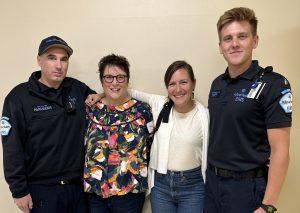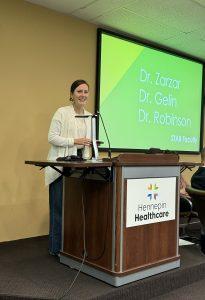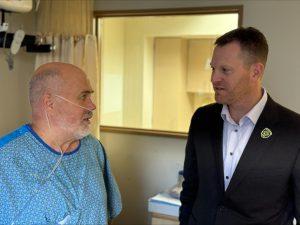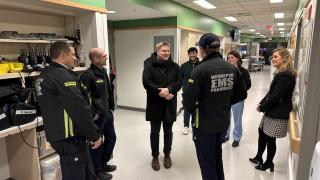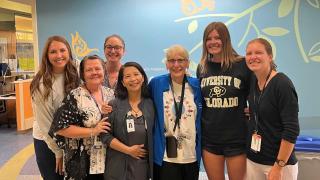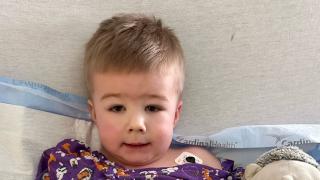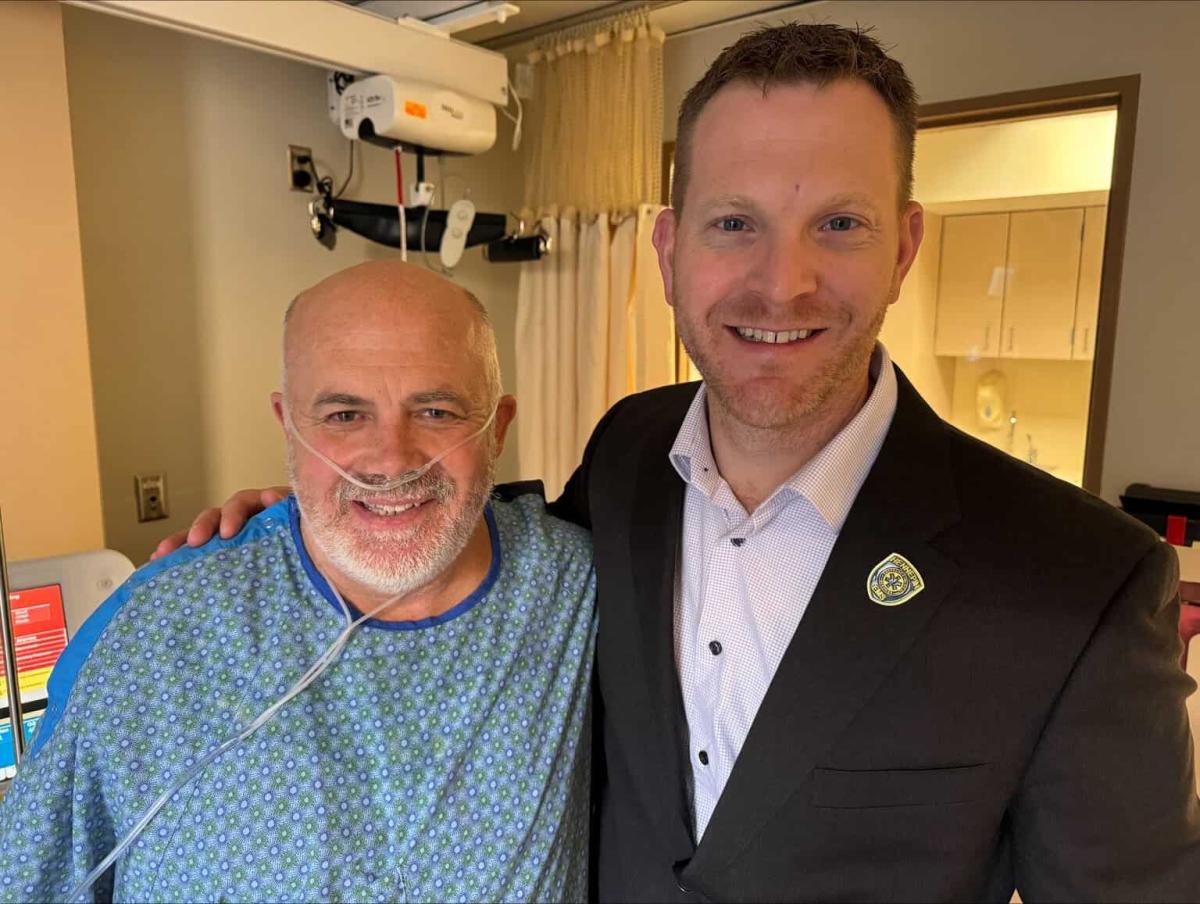
On Thursday, September 5, Scott experienced sudden chest pain, so he decided to make the drive to HCMC from one of the northern suburbs to get it checked out, figuring that calling an ambulance "might take just as long or longer anyway." But a few minutes into his drive, he had to pull over and call 911.
"First a police officer arrived, and then the Allina paramedics," he said. "They asked me where I wanted to go, and I said, 'HCMC.'"
EMS initiated critical parts of his care on scene and notified the hospital. A few minutes after the ambulance arrived, the problem was identified. He was showing signs of a massive heart attack – the kind that's referred to as a "widow-maker." The goal for the team was always clear: to get Scott to the cardiac cath lab so that the Interventional Cardiology team could open the blocked artery in the heart.
"When Scott arrived in the ED, his vitals were very normal," explained emergency physician Dr. Nick Simpson. "Although he was talking, alert and oriented, within minutes the situation took an unfortunate turn." He went into sudden cardiac arrest.
One week from the exact day and hour her husband, Scott received care in our stabilization room, Ann and her daughter listened to Dr. Simpson recap the event at the September 12 Critical Care Conference:
"The patient was brought to the ED alert and oriented by Allina EMS at 7:28 a.m.…"
"We put some pads on… just in case. Chest X-ray obtained."
"At 7:37 a.m. …the monitor… here we go… the rhythm changed to VF. No improvement with an immediate shock. At this point, it became clear that this was not a quick dysrhythmia. Rather this was a full working cardiac arrest. CPR was started. Shortly after we transitioned to LUCAS. Agonal breathing. Briefly, we shifted focus to airway management…"
Ann addressed the Critical Care Conference attendees after Dr. Simpson's presentation, saying:
"I didn't understand the terminology that was shared here this morning, but what I did understand is how much work you put into saving his life. Words really can't express how we feel about that – it's impossible to describe. But our whole family is just filled with joy and gratitude."
As he explained the patient's complicated course in the stabilization room, Dr. Simpson paused to recall reminding himself that, "We don't control what happens. All we can control are our choices and our actions."
Thankfully, the efforts of the team resulted in Scott's heart restarting after nearly 30 minutes of resuscitative efforts – offering him a chance to get to the cath lab to fix the underlying problem. The Interventional Cardiology team was successful in opening his artery and restoring blood flow to Scott's heart. From there, the Medical ICU took the lead and supported him as he began his road to recovery. Combining many skilled hands, extensive experience, and a bit of luck – Scott did well.
Often recovery from a cardiac arrest takes days to begin to get a sense of how someone's brain is doing. In this case, Scott was alert and interactive that same afternoon. The very next day, he was talking and spending time with family in the hospital. Those involved have been in awe of his remarkable course and rapid recovery.
The family that still has their husband and father are incredibly grateful for the care he received from his team. Scott's daughter, Jane, shared the following message from him at the Critical Care Conference:
Thank you to HCMC:
I know you are expecting me to wax philosophic, and so I will do so, but briefly.
It has been a genuine pleasure to watch you work. When I think of human beings and human systems, the older I get the more I think there is only one ingredient. Love. This place has that in abundance.
When I say Love, love comes in many forms so let's be specific. To become an MD requires the type of love called passion. Passion is a gravitational force, it is in part an addiction to pain, not pain for pain's sake, but seeking pain out of love for the world, out of love for each other.
There is a Greek term for this type of passion/leaning. Pathemata Mathemata, literally the path of gaining scientific understanding through the pain of lived experience.
You are a band of brothers and sisters who have lived and breathed Pathmata Mathemata - it is your passion/pain project.
In this symposium you systematically discuss your shared love and detail its tangible connections in the real world, one soul at a time, more or less in real time, and this creates an aliveness to the science you can't easily find.
At the center of everything when it comes to humans and love is we all yearn t to be a part of something meaningful that is bigger than ourselves. To become an MD, you surrendered to this passion a long time ago, and in this place, you find one of its elementary forms.
Love of this type, for each other, for the work, is the connective tissue that allows your brilliance, your passion, your dedication to shine through, when you succeed, you succeed together, when you fail, you fail together. You can only succeed if all the pieces do their part, and even then, you might not. There is no place to run or hide.
My family and I are the beneficiaries of your passion project. Your love for me, your love for each other is beautiful.
My body kept trying to leave this world, Dr. Nick and this team would not let that happen. A wrestling match. All of you have accompanied me and my family step by step so beautifully. There is a surrender, a selflessness and a deep and abiding connection that comes out of such work. The work is never done, it is one story at a time, it can be terrible, it is pain, it is passion, but is also, and paradoxically for all these same reasons, undeniably beautiful.
Here's to your passion. Here's to love. Here's to life! Thank you!
Allina EMS paramedics Richard Merkel and Ryan Wysong with Scott's wife and daughter.
Jane sharing her dad's message at the conference.
Dr. Simpson visits with Scott a week after caring for him in the emergency department.
